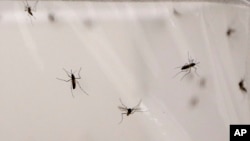Scientists in London have managed to wipe out a type of mosquito in a laboratory using a genetic engineering technique. The intervention prevented the females from reproducing and caused the entire population to die off. Scientists hope the method can be transferred from the lab to the real world to tackle mosquito populations that spread malaria
Malaria kills an estimated 429,000 people every year, many of them children. So this new method of killing a mosquito population has sparked huge interest.
Scientists from Imperial College London managed to eliminate a population of breeding Anopheles gambiae mosquitoes - the species that carries the malaria parasite - in a laboratory, using a gene drive.
Professor Andrea Crisanti, who co-led the research, says the gene drive is a technical solution that allows a genetic modification to be spread from a few individuals to an entire population.
That modification, Crisanti says, involved disrupting a gene that determines sexual differentiation.
“So in this way a genetic female, if you destroy this gene it cannot develop into a female, but [instead] develop into something between a male and female that we call ‘intersex.’ These individuals cannot bite, which is very good, cannot lay eggs and so cannot reproduce itself.”
That inability to reproduce spread across the mosquitoes - and the entire population died off within 11 generations. The big question, Crisanti says, is whether that success can be replicated outside the laboratory.
“We’ve already done, we’ve moved these mosquitoes into a large confined space which mimics completely the tropical environments. Then after this is completed, this phase will also be crucial to gather a lot of information for regulatory purposes, for example about safety, stability, ability of the gene drive to move across species.”
Scientists would not want the modified gene to spread to other mosquito species, and wipe out too many of the insects, which birds, frogs and other animals depend on for food.
Right now, testing is limited to the laboratory, with tests in the wild not expected for another five to 10 years.






